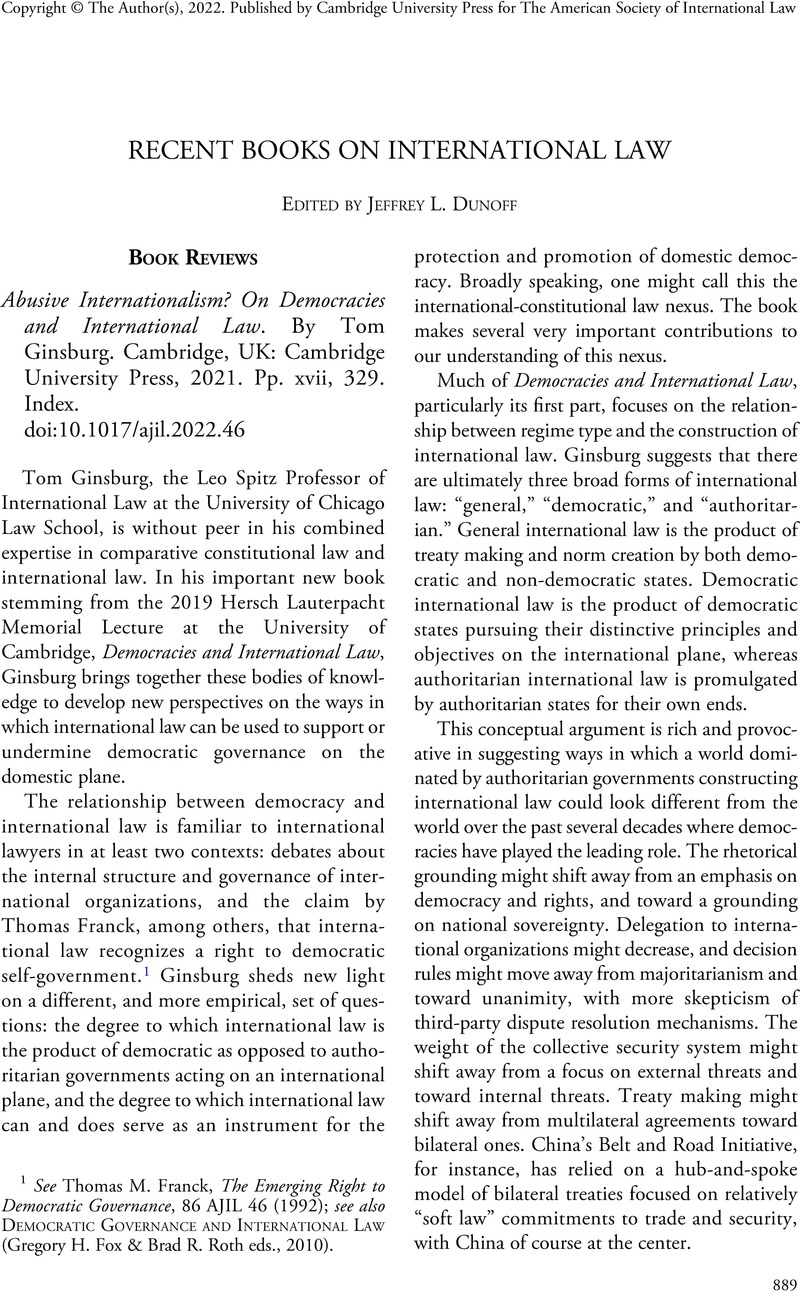No CrossRef data available.
Published online by Cambridge University Press: 27 October 2022

1 See Franck, Thomas M., The Emerging Right to Democratic Governance, 86 AJIL 46 (1992)CrossRefGoogle Scholar; see also Democratic Governance and International Law (Gregory H. Fox & Brad R. Roth eds., 2010).
2 See Tom Ginsburg & Aziz Z Huq, How to Save a Constitutional Democracy (2018).
3 See Rosalind Dixon & David Landau, Competitive Democracy and the Constitutional Minimum Core, in Assessing Constitutional Performance 268 (Tom Ginsburg & Aziz Huq eds., 2016).
4 We called this “transnational anchoring.” See Dixon, Rosalind & Landau, David, Transnational Constitutionalism and a Limited Doctrine of Unconstitutional Constitutional Amendment, 13 Int'l J. Const. L. 606 (2015)Google Scholar.
5 See, e.g., Roberts, Anthea, Traditional and Modern Approaches to Customary International Law: A Reconciliation, 95 AJIL 757 (2001)CrossRefGoogle Scholar.
6 See, e.g., Protecting Democracy: International Responses (Morton H. Halperin & Mirna Galic eds., 2005).
7 See, e.g., Scheppele, Kim Lane, Autocratic Legalism, 85 U. Chi. L. Rev. 545 (2018)Google Scholar.
8 See Landau, David E, Roznai, Yaniv & Dixon, Rosalind, From an Unconstitutional Constitutional Amendment to an Unconstitutional Constitution? Lessons from Honduras, 8 Glob. Const. 40 (2019)Google Scholar.
9 See Rosalind Dixon & David Landau, Abusive Constitutional Borrowing: Legal Globalization and the Subversion of Liberal Democracy (2021) [hereinafter Dixon & Landau, Abusive Constitutional Borrowing].
10 See, e.g., Contesse, Jorge, The Final Word? Constitutional Dialogue and the Inter-American Court of Human Rights, 15 Int'l J. Const. L. 414 (2017)Google Scholar.
11 The examples in this paragraph and the next are drawn from Dixon & Landau, Abusive Constitutional Borrowing, supra note 9.
12 See Nikolay Koposov, Memory Laws, Memory Wars: The Politics of the Past in Europe and Russia (2017).
13 See Keleman, R. Daniel & Pech, Laurent, The Uses and Abuses of Constitutional Pluralism: Undermining the Rule of Law in the Name of Constitutional Identity in Hungary and Poland, 23 Camb. Y.B. Eur. L. Studs. 59 (2019)Google Scholar.
14 See European Commission for Democracy Through Law (Venice Commission), Study No. 908/2017, Report on Term Limits Part I – Presidents, CDL-AD(2018)010.
15 Advisory Opinion OC-28/21, Presidential Reelection Without Term Limits in the Context of the Inter-American Human Rights System (Inter-Am. Ct. Hum. Rts. June 7, 2021), available at https://www.corteidh.or.cr/docs/opiniones/seriea_28_eng.pdf.
16 See Dixon & Landau, Abusive Constitutional Borrowing, supra note 9, at 193.
17 See, e.g., Mutua, Makua W., What Is TWAIL?, 94 ASIL Proc. 31 (2000)Google Scholar.